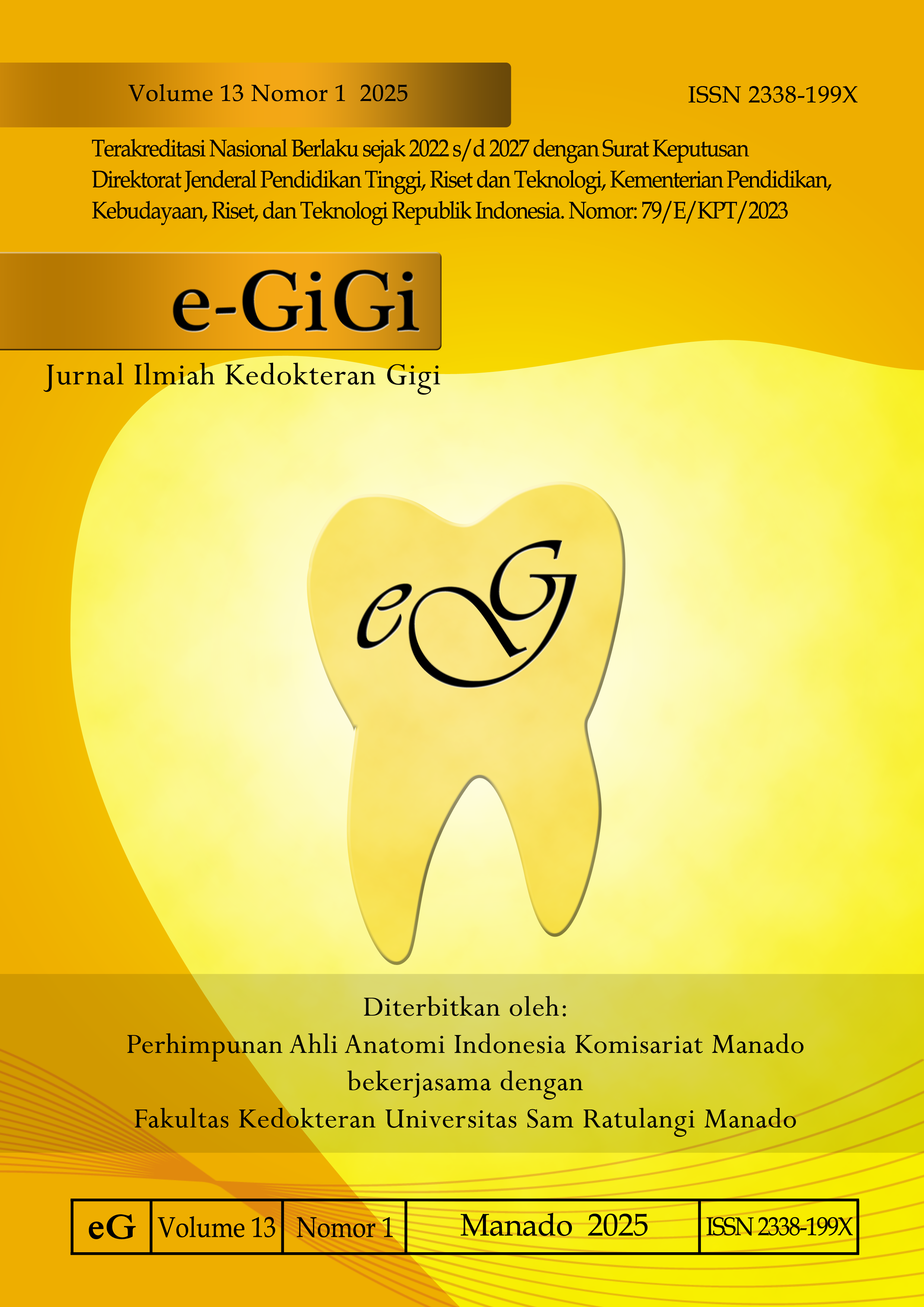Perbaikan Retensi pada Gigi Tiruan Lengkap: Laporan Kasus
DOI:
https://doi.org/10.35790/eg.v13i1.57575Abstract
Abstract: Losing all teeth in the oral cavity is a challenge for dentist, especially in patients who never use dentures or in patients who have a history of uncomfortable dentures. We reported a 70-year-old male patient who complained that his newly made dentures were loose and difficulty in swallowing. The dentures were made three months ago and he felt uncomfortable while using them. After observing the old complete dentures, we found that the denture flanges were overextension, therefore, the dentures often fell off when used. The patient wanted to have new dentures, so he could eat properly. The new complete denture was made by paying attention to the flanges and posterior palatal seal areas to obtain better retention and stability. Individual tray and border molding as well as physiological impression were made carefully to obtain optimal result. In conclusion, the new dentures provide better retention and the patient is satisfied with the result. Good retention and stability of complete dentures can improve the quality of life of patients, especially the eldery.
Keywords: retention; stability; border molding; posterior palatal seal
Abstrak: Kehilangan semua gigi dalam rongga mulut merupakan tantangan bagi dokter gigi terutama pada pasien yang belum pernah menggunakan gigi tiruan lepasan sebelumnya atau pada pasien yang telah memiliki riwayat dimana gigi tiruannya tidak nyaman. Kami melaporkan kasus seorang pasien laki-laki berusia 70 tahun dengan keluhan gigi tiruan yang baru dibuat tiga bulan lalu terasa sering lepas dan kesulitan menelan. Setelah diobservasi gigi tiruan lengkap yang lama memiliki sayap gigi tiruan yang terlalu panjang sehingga sering lepas ketika digunakan. Pasien ingin dibuatkan gigi tiruan baru dengan harapan dapat makan dengan lebih baik. Gigi tiruan lengkap yang baru dibuat dengan memperhatikan tepi-tepi sayap dan daerah posterior palatal seal sehingga didapatkan retensi dan stabilitas yang lebih baik. Sendok cetak perorangan dan penutupan batas tepi serta pencetakan fisiologis dilakukan dengan seksama untuk mendapatkan hasil yang optimal. Simpulan kasus ini ialah gigi tiruan baru memberikan retensi yang lebih baik dimana pasien puas dengan gigi tiruan yang baru. Retensi dan stabilitas yang baik dari gigi tiruan lengkap dapat meningkatkan kualitas hidup pasien terutama pada lansia.
Kata kunci: retensi; stabilitas; penutupan tepi; batas posterior palatum
References
Zarb GA, Hobkrik J, Jacob R. Prosthodontics Treatment for Edentulous Patients (13th ed). US: Elsvier; 2013. p 35-7, 53-6.
Pridana S, Nasution ID. Bentuk residual ridge dan hubungannya dengan retensi gigi tiruan penuh. Cakradonya Dent. J. 2016;8(1):55-9. Available from: download.garuda.kemdikbud.go.id/article.php?article=33562 79&val=29421&title=Bentuk%20Residual%20Ridge%20dan%20Hubungannya%20Dengan%20Retensi%20Gigi%20Tiruan%20Penuh
Tarigan T, Ismet DN. Alveolar arch and shapes and its relation to complete denture retention. JDS. 2020;5(1):30-36. Doi: 10.24815/jds.v5i1.18426
Shawi H, Dirbal M, Altireeki S, Alriyani A, Arifin Z. Improving the retention of maxillary complete denture: a case report. Alq J Med App Sci. 2024;7(1):113-20. Available from: https://doi.org/10.54361/ajmas.2471018
Sharma A, Singh R, Sharma R, Dhanda A, Neha, Thakur V. Post insertion problems in complete denture: a review. IP Annals of Prosthodontics and Restorative Dentistry. 2020;6(4):189–93. Available from: https://doi.org/10.18231/j.aprd.2020.040
Gupta R, Singh P, Vashisth D, Arora N, Chib V. Post insertion denture instructions, problems dan its management in complete denture patients-a review. International Journal of Research in Health and Allied Sciences (IJRHAS). 2020;6(6);61-8. Available from: https://ijrhas.com/abstractissue.php?id=921
Foiles Sifuentes AM 1, Castaneda-Avila MA, Lapane KL. The relationship of aging, complete tooth loss, and having a dental visit in the last 12 months. Clin Exp Dent Res. 2020;6(5):550-557. Doi: 10.1002/cre2.309
McCord JF, Grant AA. Identification of complete denture problems: a summary. Br Dent J. 2000;189(3):128-34. Doi: 10.1038/sj.bdj.4800703
Binu G, The Textbook of Complete Denture Prosthodontics. New Delhi: CBS Publishers & Distributors; 2006. p. 68-76.
Ali MSA, Al-Harbi F. Posterior palatal seal area established in conventional and CAD/CAM fabricated complete denture techniques: clinical case study. J Den Craniofac Res. 2016;1(1):1-6. Doi: 10.21767/2576-392X.100003
Subashri A, Suresh V. Identification of the posterior palatal seal by anatomical landmarks. PJAEE PalArch’s Journal of Archaeology of Egypt/Egyptology (PJAEE). 2020;17(7):208-16. Available from: https://archives.palarch.nl/index.php/jae/article/view/1127
Mariyam A, Verma AK, Saurabh C, Ahmad Naeem A, Anuj S. Posterior palatal seal (PPS): a brief review. Journal of Scientific and Innovative Research (JSIR). 2014;3(6):602-5. Available from: www.jsirjournal.com
Downloads
Published
How to Cite
Issue
Section
License
Copyright (c) 2024 Anita Anita, Melisa Melisa

This work is licensed under a Creative Commons Attribution-NonCommercial 4.0 International License.
COPYRIGHT
Authors who publish with this journal agree to the following terms:
Authors hold their copyright and grant this journal the privilege of first publication, with the work simultaneously licensed under a Creative Commons Attribution License that permits others to impart the work with an acknowledgment of the work's origin and initial publication by this journal.
Authors can enter into separate or additional contractual arrangements for the non-exclusive distribution of the journal's published version of the work (for example, post it to an institutional repository or publish it in a book), with an acknowledgment of its underlying publication in this journal.
Authors are permitted and encouraged to post their work online (for example, in institutional repositories or on their website) as it can lead to productive exchanges, as well as earlier and greater citation of the published work (See The Effect of Open Access).






